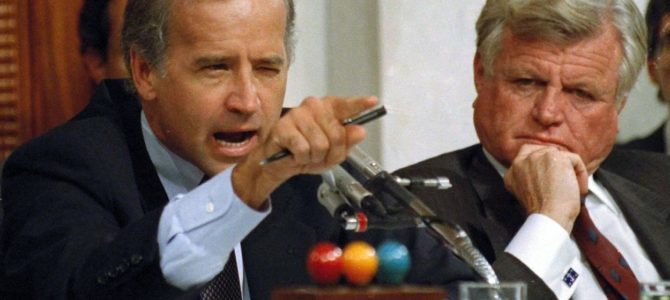
It’s apparently never too early for presidential politics. Right now, former vice president Joe Biden tops, or nearly tops, every poll assessing the popularity of the potential 2020 Democratic presidential field. Biden, reportedly still mulling over whether 76 is too old to run for president, has claimed he’s the “most qualified person” for the position. Considering the players in the Democratic field, it’s difficult to argue otherwise.
Then again, the idea that experience is a determining factor for voters is a dubious one. The past two president have had little policy experience. Most of the Democratic field––at least the senators––has never voted for any consequential legislation. The most significant position, it seems, is how melodramatic a candidate can get about the imagined dystopia of the Donald Trump era. And when it comes to hyperbole, Biden is a heavyweight.
For Biden, though, another question remains: if his history and experience in Washington (he arrived in 1973) is the central argument for his candidacy, why does he spend so much of his time telling us how much he regrets his past decisions? The number of stances a former moderate Democrat has to reject just to be accepted by his party’s base is rather amazing. We’re not talking about inconsequential, long-forgotten partisan fights, either. We’re talking about some of the biggest debates of the past 50 years.
How does Biden feel about his 35 years of supporting virtually every expansion of the drug war and mass incarceration––even authoring the Violent Crime Control and Law Enforcement Act? He regrets it. How does Biden feel about his voting to repeal Glass–Steagall, which Democrats like to blame for the 2007 recession? He regrets it. His vote to authorize use of force in Iraq? He regrets it.
Has Biden ever really explained his 1996 support for conservative policy victories like welfare reform to the progressives of Democratic Party activist base? The then-Delaware senator even voted for the iteration of welfare reform that Bill Clinton vetoed. Has he ever really explained his strong support for the allegedly pro-bank bankruptcy bill of 2005 to anti-capitalist progressive dogmatists? Or his vote for an “immoral” border wall in 2006?
I’m sure Biden will regret all of it. Because Biden’s biggest regret is not being president.
When he’s not regretting his past, though, he’s evolving from it. In 2015, Biden gave a speech to a gay marriage advocacy group, only a couple of years after his boss, President Barack Obama, finally decided it was safe to support same-sex marriage. “In 1983 there was a Harvard student making the constitutional rights for gay marriage. I’m going to quote directly,” Biden said, “’Human rights radiates from the constitution, shedding light on the central values of freedom and equality.’ That was the basis of which I took on Judge Bork.”
The subtle dishonesty of this statement is a good example of Joe Biden’s preternatural shamelessness. It’s one thing to say you’ve “evolved” on an issue. After all, Biden will have to claim evolution on virtually every issue. Biden’s smearing of Bork and other judicial nominees is well documented. The ugly tactics the senator adopted are still a big part of Democratic Party playbook, as the Brett Kavanaugh confirmation hearings show.
But Biden’s disgraceful conduct towards Bork came in 1987. Even 11 years later, in 1996, Biden supported banning gay marriage on the state level by voting for the Defense of Marriage Act. In revisionist liberal history, a reluctant President Bill Clinton was forced to sign the law under political duress. In the real world, plenty of Democrats, including Chuck Schumer, Bob Menendez, Dick Durbin, Patrick Leahy, Patty Murray, and, of course, Biden, supported it.
But Biden was so moved by a Harvard student’s statement on gay marriage that it took him around 30 years to change his mind––exactly when everyone else in his party did.
Abortion is another good example of Biden’s shamelessness. Before his vice presidential turn, Biden claimed a tepid pro-choice position that was predicated on the preposterous notion that a person can believe the procedure ends a life but also that it’s not a “political” issue.
Yet, back in 1976, Biden voted for the Hyde Amendment, a law banning federal funds to pay for abortion. (He voted to save the Hyde Amendment in 1993.) Back in 1981, it was the “Biden amendment” to the Foreign Assistance Act that banned any American aid from being used in research related to abortions. In 1982 (via reporting from Mother Jones), Biden proposed a law overturning Roe v. Wade. In 1984, Biden supported the “Mexico City policy,” which bans federal funding for private organizations that provide abortion, advocate to decriminalize abortion, or expand abortion services. In 1995 and 1997, Biden voted for partial-birth abortion bans that would be vetoed by Bill Clinton.
By 2016, the Democratic platform had an explicit call to repeal the Hyde Amendment. Biden supported candidates who backed zero restrictions on abortion–including a presidential candidate like Hillary Clinton, whose position had “evolved” from seeing abortion as “safe, legal, and rare” to supporting state-funding for abortions on demand from conception to crowning.
A constant theme over the 50 years has been that the Republican Party is “radicalizing.” Even Ronald Reagan wouldn’t be welcome in the modern Republican Party, goes the familiar argument. Perhaps the tone or focus of Republicans changed, but the contemporary conservative base supports many, if not most, of the same agenda items it did four decades ago. Deregulation. Tax cuts. Border protection. Social issues.
Biden’s constant rejection of his own record, on the other hand, is a testament to sharp, and continually accelerating, leftward lurch of the Democratic Party. The radicalism on the abortion issue is new, sure. But attacks on basic constitutional tenets are also new. The embrace of socialism is new. The rejection of a border is new.
Biden will be on board for all of it, of course, because Biden is always on board.









